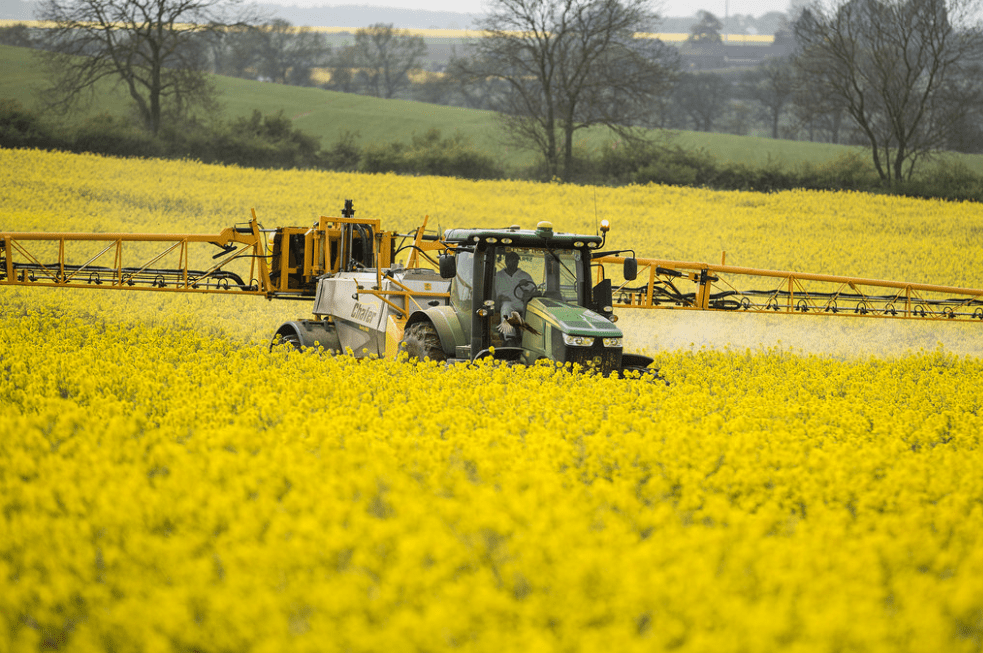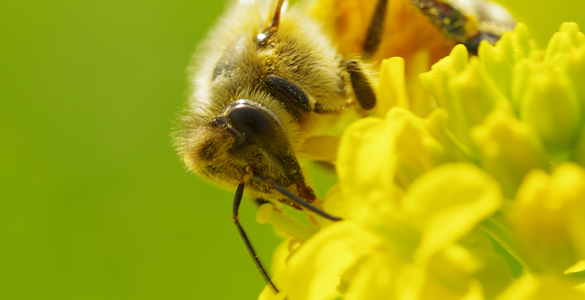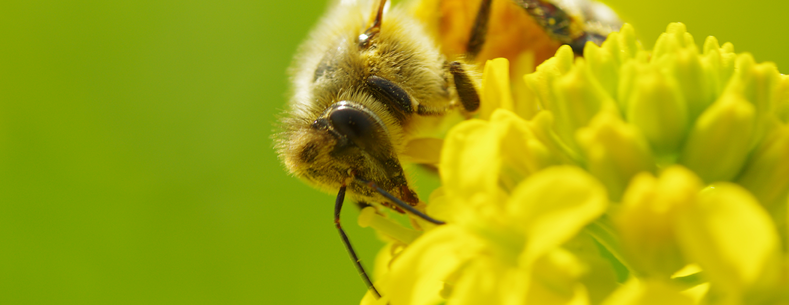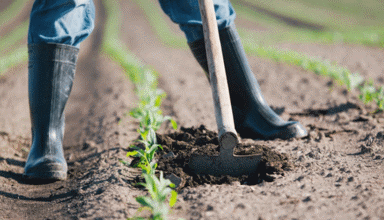What are neonicotinoids and why are they so controversial?
Neonicotinoids are a class of pesticide used in crop production to manage insect pests (they are called 'plant protection products' in EU and UK legislation). First available for use in the 1990s, neonicotinoids are now the most widely used pesticides worldwide. This is because they are relatively less toxic to mammals and birds than older pesticides. However, there have been many reports of death of honeybees and wild bees attributed to neonicotinoids and since 2008 several European countries have banned or restricted their use.
One feature of UK agriculture is that pollination comes from wild insects and honeybee hives. They provide a ‘natural' ecosystem service as opposed to commercial pollination services which can control the exposure of bees to sprayed crops.
In the UK as a whole 20% of the cropped area is dependent on pollinators. The corresponding figure for Wales is 12%, but a large area of grassland and other vegetation, such as wild flowers, is also dependent on pollination provided by insects susceptible to neonicotinoids. Therefore environmental stakeholders are concerned that declines in bee populations as a result of neonicotinoid exposure could impact on pollination across the landscape.
Indications of the potential danger from neonicotinoids come from the first surveys of English rivers conducted in 2016 under EU water regulations. They revealed water contamination at levels that might harm birds and fish. 
What regulatory action has the EU taken?
Under the current EU Regulations (No 1107/2009) there is a two-tier system of pesticide registration.
Firstly, the European Commission is responsible for approving ‘active substances’, the actual chemical ingredients of pesticides. The Commission is advised on scientific evidence and risk assessment by European Food Safety Authority (EFSA).
Secondly, Member States are responsible for authorising plant protection products formulated with approved active substances made available on the market to farmers. This arrangement allows food produced using authorised plant protection products to be sold throughout the EU Single Market, as long as regulations on residue limits in food are complied with.
In 2012 the European Commission asked the EFSA to investigate the safety of three neonicotinoids, in response to growing concerns about the impact of neonicotinoids on honeybees. The study, published in January 2013, states that neonicotinoids pose an unacceptably high risk to bees. It highlighted the potential exposure of bees through pollen and nectar, and dust from granular application.
In December 2013 the Commission restricted the use of these three neonicotinoids in flowering crops for two years in the first instance. The ban is still in place as further evaluation of the neonicotinoids has been ongoing with the EFSA issuing an open call for data regarding risk to bees from neonicotinoids. However, the EU permits Member States to issue Emergency Authorisations for uses that are ‘limited and controlled’.
The Commission was due to vote on the continuation of the ban in March 2017, however it has been delayed because of lack of agreement among Member States. The vote is now expected in early 2018.
In February 2018, the EFSA published an updated risk assessment confirming that most uses of neonicotinoid pesticides represent a risk to wild bees and honeybees. The Commission and the Member States will now examine these conclusions and depending on the outcome of this analysis, the Commission may propose to further modify the conditions of approval of these neonicotinoids.
How has the UK responded?
The UK was one of eight Member States to vote against the restrictions originally imposed in 2013. In 2015 the UK Government granted a temporary authorisation in England (PDF 120KB) after the National Farmers Union (NFU) said the neonicotinoids were essential for use in oilseed rape against the cabbage stem flea beetle.
Objections to a ban on neonicotinoids from farmers and the pesticide industry in the UK centred on the lack of direct evidence from field studies of long-term effects of neonicotinoids on bee populations. At the same time, farmers were claiming that a high percentage of their crops failed because of pest damage.
However, on 20 April 2017, the UK Government rejected applications from the NFU for emergency registration of the two neonicotinoids most used in the UK because the criteria for emergency authorisation had not been met.
In November 2017, the Environment Secretary, Michael Gove, indicated that the UK would support an extension of the EU ban.
How might Brexit affect restrictions on neonicotinoids in the UK?
As discussed previously, EU Regulation (No 1107/2009) provides criteria for approving active substances, including criteria in relation to honey bees. At the time of writing, the degree of regulatory alignment or divergence that will occur after Brexit is not known. However, crop-based food exported to the EU must comply with the EU's regulatory regime in all aspects of food safety, including only using EU authorised plant protection products and abiding by the EU's residue limits. If the UK leaves the Single Market, the questions to be answered on pesticide regulation are:
- Whether/how will this Regulation (transposed into UK legislation) be amended?
- Will the UK's post-Brexit regime for registering pesticides mirror that in the EU Regulation?
- Will the UK continue to have access to EFSA for this purpose? (A key issue is the future relationship of the UK with the EFSA as the EU body legally responsible for providing advice on active substances to the Commission).
- Will a UK body take over responsibility for approval of active substances from the Commission? (Currently the UK Chemicals Regulation Division under the Health and Safety Executive authorises plant protection products at UK level with the latter responsible for ensuring safe use and providing guidance on registration, labelling, etc.).
How might Brexit affect devolved powers for agriculture and the environment in Wales?
Wales has devolved legislative powers for agriculture and the environment. However there is uncertainty over how devolved powers will be affected as the UK leaves the EU.
The devolved administrations and the UK Government have been working together to identify where common frameworks may need to be established in areas currently governed by EU law with devolved intersection, such as agriculture. The Joint Ministerial Committee (European Negotiation) has agreed that common frameworks will be established where they are necessary in order to (amongst other things) enable the functioning of the UK internal market, while acknowledging policy divergence.
The UK Government has recently published an analysis of the common frameworks. Pesticide regulation falls within the 24 policy areas that ‘are subject to more detailed discussion to explore whether legislative common framework arrangements might be needed, in whole or in part’. Therefore the legislation for pesticide registration and pesticide residues that emerges after Brexit may apply across the UK in a common framework approach. Discussions are on-going. Consideration should also be given to the Sustainable Use Regulations 2012 that transpose the EU Directive to the same effect.
Article by Dr Robert Black, University of Greenwich, edited by Dr Katy Orford, National Assembly for Wales Research Service
Source: Image by Chafer machinery from Flickr. Licenced under the Creative Commons






